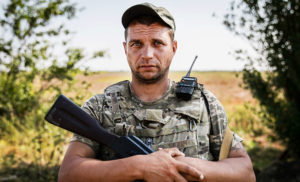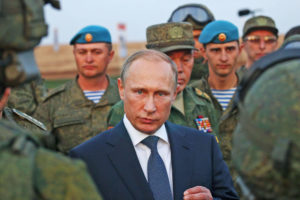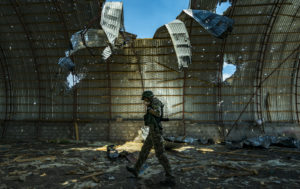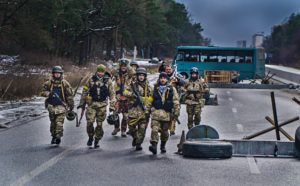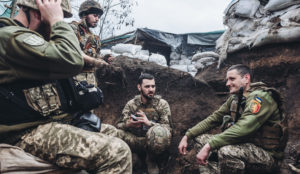“Let that motherfucker send as many slaves as he wants. It won’t make any difference. We will send them back to Russia in boxes, like we did to the ones he sent already.”
“Ivan” pauses. He is involved in civilian resistance activities in Southern Ukraine, and he has pointed views on the occupiers, borne from first-hand experience. “Well, actually, the Russians generally just leave their dead behind in the field. So they don’t go back to Russia, in fact. We fertilise our soil with them.”
On the morning of 21 September, President Vladimir Putin went on Russian State TV to face his nation and, by proxy, the world. He told his people that there would be a mass but limited mobilisation for the war in Ukraine. He would be calling up “military reservists, primarily those who served in the armed forces and have specific military occupational specialities and corresponding experience”. It would be Russia’s first mobilisation since World War II, which he announced on the International Day of Peace. For all his flaws, Putin does have a sense of humour.
The speech comprised Putin’s usual mix of mendacity, self-pity and delusion: a toxic combination in autocrats that invariably leads to violence (just ask the people of Iran). He began by talking about the need to protect the “sovereignty, security, and territorial integrity of Russia”. By this, he meant areas inside Ukraine that Russia has stolen and now occupies.
His declarations come in the wake of the recent Kyiv counteroffensive that has driven Russian troops out of much of the north-eastern parts of Ukraine. Of course, Russia could never have lost to Ukrainians. It was, as Putin explained, the West that is behind Russia’s recent defeats — not that he calls them defeats — because it “wants to destroy our country.” For that reason, the West is trying to “turn Ukraine’s people into cannon fodder”.
According to Putin — and it’s important to understand this — the West unleashed this aggression “back in 2014”. What actually happened was that Russian soldiers marched into Crimea without provocation, stole it, and then invaded eastern Ukraine. It was retaliation against the Ukrainian Euromaidan Revolution of 2013, which overthrew Kremlin stooge Viktor Yanukovych: Putin could not allow a democratic revolution next door to pass off without issue. Who knew what thoughts it might put into the heads of his own oppressed citizens?
Putin refers to Ukraine’s post-Euromaidan government as “the result of a state coup”. He is, it seems a stickler for democracy. Between the 23-27 September, there will be “referendums” in the occupied territories of Ukraine over formal annexation to Russia. Pretty much the entire world has, inevitably and correctly, denounced them as a sham.
Putin now posits his unprovoked and militarily foolish invasion of Ukraine as an existential conflict for Russians: “The goal of that part of the West is to weaken, divide and ultimately destroy our country. They are saying openly now that in 1991 they managed to split up the Soviet Union and now is the time to do the same to Russia, which must be divided into numerous regions that would be at deadly feud with each other.”
With its paranoia about Western intentions, nostalgia for a supposedly halcyon USSR, and belief that Russia must fight (ergo, conquer more land) to survive, this statement pretty much sums up the entirety of Putinist foreign policy over the last 15 or so years. The international reaction has been as expected. Ukrainian President Volodymyr Zelenskyy was typically eloquent: “Putin wants to drown Ukraine in blood, including the blood of his own men.” UK Defence Secretary Ben Wallace saw it as an “admission that his invasion is failing”, and that Russia is fast becoming a “global pariah”.
Recent events have undoubtedly been a colossal setback for Russia. There have now been 7 months of fighting and Putin has failed to meet the 15 September deadline he set his army to take the Donetsk region. In that time, it has suffered. Russian Defence Minister Sergei Shoigu has gone on record admitting that his people may have sustained up to 6,000 casualties. Ukraine claims the figure is over 55,000. The truth lies somewhere in between (though almost certainly closer to Kyiv’s estimation than Moscow’s). And this doesn’t take into account the hundreds of desertions from the Russian army to date.
Back in Moscow, there was even public criticism from former parliamentarian Boris Nadeszhdin. “It’s either full scale war or we get out,” he said on a heated panel discussion on state TV. Nadeszhdin is an “approved” opposition figure, so his comments were to be expected. Nonetheless, he voiced what many are thinking: the war is not going to plan, despite Kremlin claims that its retreat in Kharkiv was a tactical move.
The Ukrainians are, naturally, loving all of this. The Defence of Ukraine tweeted on Tuesday: “Why did the chicken cross the road? Because it was regrouping”.
Putin is not the only one with a sense of humour.
“This [mobilisation] means the war is coming ever closer to ordinary Russians.” “Petya” is a Ukrainian soldier on the country’s southern front, and he’s weighing up what recent events mean for those on the front lines. “He recognised that he needed more troops, more people to reach his goals. Before this moment, for ordinary people in Russia, this war was something very far away but now, ordinary Russian people will feel what this war means in their personal life.”
This is important. Even in a dictatorship, which Russia emphatically is — no matter how many democratic veneers Putin tries to paste over his actions — you can’t enrage too many people too many times if you want to govern more or less unhindered. When I was last in Ukraine, over the summer, I lost count of how many people told me the USSR’s failed invasion of Afghanistan was the final nail in its coffin.
At first glance, Russians are unhappy. The most searched terms on the internet in Russia following the announcement were, according to one anonymous tweeter, “how to break your arm”; “how to leave Russia”; “foreign passport”; and then “how to avoid mobilisation”. There’s a great joke doing the rounds in Moscow right now, too. “As a reservist, you have been mobilised!” “Who are we fighting with?” “The Nazis.” “Yes, but against whom?”
Discontent is being expressed in various ways. One-way airline tickets are soaring in price and selling out fast. Meanwhile, small-scale protests are making themselves heard in towns across the country, and over 1,000 Russians have now been arrested for dissent. In a country where you can get 15 years in prison for speaking out, these are the acts of either extremely brave, or extremely fed up, people. Both are a grave danger for despotic regimes.
Then again, Russians are often unhappy. As a Russian friend once said to me: “Yeah, politics sucks, but it’s like the weather: you can’t do anything about it.” Any claim that Putin is in imminent political or indeed personal danger must be dismissed as almost certainly false — with the caveat that in life, and especially in Russia, anything can happen.
Petya understands the truth of all this. “The future of this war depends not only on the force of the Russian army against the Ukrainian army, but also on the views and position of the Russian people.” And he is hopeful. As are most military-minded Ukrainians I speak to. Ignore the noise (or as one so memorably put it, “politician bull poo poo”) and look at what is happening on the ground. Ukraine continues to advance in the North, having retaken over 8000 square kilometres to date, and soon hopes to encircle the city of Kherson in the occupied south (a goal that might be a touch too ambitious).
Kyiv is not letting up. Zelenskyy is now focused on “speed” in liberated areas. Ukrainian forces just captured Bilohorivka, a small village in Luhansk, which is a small but symbolic achievement, as it’s 10km west of the city of Lysychansk, which fell to the Russians in July. This causes Russia more problems. In each new territory that Ukraine seizes back, more evidence of Russian atrocities emerges: more mass graves, more scenes of torture, more tales of the brutality of occupation from those who endured it.
Putin’s response is simple. “People in the Zaporozhye and Kherson regions, in Lugansk and Donetsk, saw and are seeing now the atrocities perpetrated by the Neo-Nazis in the (Ukrainian-)occupied areas of the Kharkiv region,” he said. It’s a simple rhetorical device beloved of despots everywhere: just deny the reality of everything. And keep denying it. Blame the victims; you know most won’t swallow the nonsense, but the crucial constituency will.
It doesn’t matter that people can see the truth on TV. It doesn’t matter that they can read it in the press and hear it on the radio. This is what totalitarianism is: the Leader controls not just your civil rights and your freedoms, but your very senses, too. What you heard you did not hear; what you saw you did not see.
But once you go down the road to outright despotism, there is no going back. There can be no failure either, as failure can only lead to downfall or death, and usually both. “Partial mobilisation by Russia means only one thing,” continues Petya. “The defeat of the so-called special military operation declared by Vladimir Putin. And practically, it means that Putin has recognised defeat.”
But if Putin has recognised the defeat of what he thought would be a “special military operation”, he cannot accept the defeat of the wider invasion of Ukraine. In his speech, he said Russia will “use all the means at our disposal to protect Russia and our people. It’s not a bluff.” He was talking about nuclear weapons — his ultimate trump card. If it’s a sign of weakness (and it is), it’s also a sign of how far nuclear taboos have been eroded. Throughout the whole of the 1962 Cuban Missile Crisis, neither John F. Kennedy nor Nikita Khrushchev once mentioned the possibility of nuclear strikes. The Kremlin now alludes to it on a daily basis.
The Russian establishment remains mostly united and on message. Recently, Andrey Gurulyov, State Duma Deputy, expressed a desire to end Ukraine’s existence. Russia’s largest defence company, Rostec, has drastically increased its arms production after bringing in an overtime schedule.
On the ground, though, Petya is equally determined. “Nothing has changed because we still continue to defend our country,” he says. “We see our task as still the same as it was before [the mobilisation]. Our goal is to liberate occupied territories of Ukraine and achieve victory over Russia. Every soldier understands this goal, and the military spirit [morale] is still very high.”
But to do this, as Petya knows, Ukraine will keep needing Western weapons and support. Key to the Kremlin’s strategy is the belief that we will eventually give up and abandon Ukraine. It’s easy to see the logic behind this. Putin looked at Iraq; to Barack Obama’s failure to keep to his own redline after chemical weapon use in Syria; and most recently to the flight from Afghanistan; and he concluded the West was exhausted and spent.
So far, we have proved him wrong. The EU Council just adopted a new €5bn assistance package. When I met Foreign Office officials recently, the message was simple: full steam ahead with supporting Ukraine. Britain has a new Prime Minister, fully aligned with her predecessor. She has made this abundantly clear.
Petya is keen to emphasise the importance of this continuing support. “To reach victory we need more help from the side of our Western partners,” he says. “We need new armaments, we need new technologies. We see that Russia’s entire policy is its human potential but not technology — winning by quantity, not quality. That’s all they can do.”
Now, across the occupied territories the referendums are beginning. Putin is going to annex larges parts of southern Ukraine to Russia. But as much as he tells himself — and Russians — otherwise, this will only make Ukrainians, yet again, more determined to resist; and the Russians, yet again, more violent. Yesterday morning I received a message from a Ukrainian friend. “News from Kh [Kherson] are bad. Russians with riffles and unforms [sic] coming in villages from house to house and press people top vote. Often threaten if they don’t want to.”
The war is far from over — the violence will continue; Ukrainians will continue to die. And so the West’s involvement must continue, too. There can be no retreat — either for Ukraine, or for the international order we have so painstakingly built over the seven decades, since the last time a tyrant unleashed industrial war on the European continent.
Disclaimer
Some of the posts we share are controversial and we do not necessarily agree with them in the whole extend. Sometimes we agree with the content or part of it but we do not agree with the narration or language. Nevertheless we find them somehow interesting, valuable and/or informative or we share them, because we strongly believe in freedom of speech, free press and journalism. We strongly encourage you to have a critical approach to all the content, do your own research and analysis to build your own opinion.
We would be glad to have your feedback.
Source: UnHerd Read the original article here: https://unherd.com/

